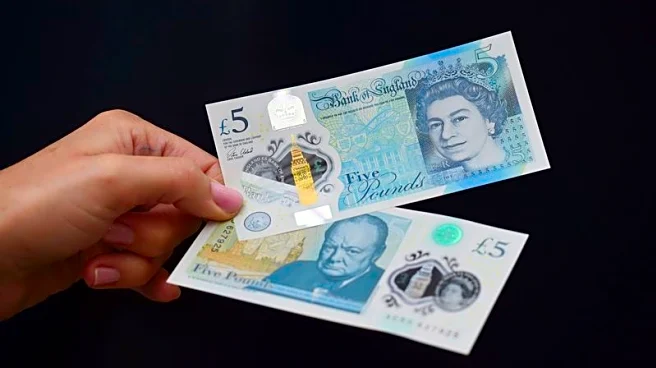By Amanda Cooper
LONDON (Reuters) -The pound edged up on Tuesday, but still headed for its fourth monthly loss against the euro and its first loss since July against the dollar, where short-term action has been dominated by the risk of a U.S. government shutdown.
U.S. President Donald Trump and his Democratic opponents appeared to make little progress at a White House meeting aimed at heading off a shutdown. Investors worry a shutdown would disrupt the publication of this Friday's monthly jobs report
and other data that normally inform the thinking of Federal Reserve policymakers, who next meet in late October.
Both sides said subsequently the other would be at fault if Congress fails to extend government funding beyond a Tuesday midnight deadline (0400 GMT Wednesday).
UK DEFICIT WELL ABOVE FORECAST
Back in the UK, data on Tuesday showed Britain's economy expanded by just 0.3%, in line with forecasts, in the three months from April to June, while the current account deficit in that time hit 28.939 billion pounds ($38.8 billion).
This was well above a poll forecast of 24.9 billion pounds and equivalent to 3.8% of GDP, up from 2.8% in the first quarter of 2025.
The numbers did little to ruffle the pound, which was up 0.15% at $1.34505. It has lost around 0.5% against the dollar so far this month, but nearly 0.9% against the euro, which has forged higher almost uninterruptedly since late May, gaining nearly 4.5% in the process.
The euro has been a major beneficiary of investor appetite for an alternative to the dollar, but it has also drawn in flows from those whose concern is growing about the stability of Britain's finances.
TAX HIKE EXPECTED
The UK has the highest government borrowing costs in the developed world, as well as the highest rate of inflation.
Finance minister Rachel Reeves is widely expected to hike taxes at the budget on November 26 to fill a fiscal hole which economists forecast at tens of billions of pounds, as she fights to stick to her own fiscal rules.
"There is nothing in today’s release to change the widely held opinion that the Chancellor will once again be raising taxes," John Wyn-Evans, head of market analysis at asset manager Rathbones, said.
Reeves said on Monday she was sticking to the Labour Party's manifesto commitments not to raise sales tax, known as value added tax (VAT), national insurance contributions or the rates of income tax, but added there would be hard choices to make in November.
(Reporting by Amanda Cooper; Editing by Aidan Lewis)
















